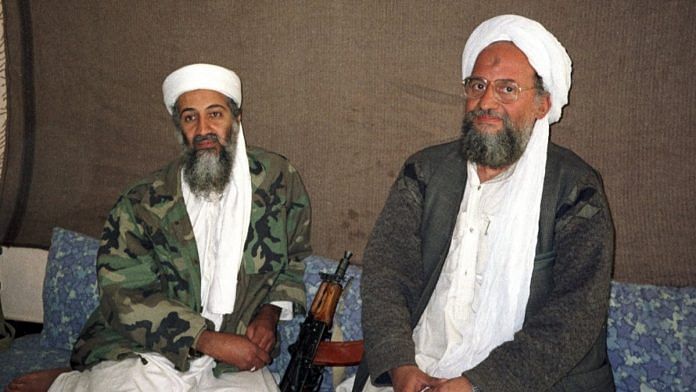New Delhi: Al Qaeda leader Ayman al-Zawahiri, who was rumoured to be dead, resurfaced in a video released on the 20th anniversary of the 11 September 2001 terror attacks last week.
According to SITE Intelligence Group, a US-based organisation that tracks online activities of global terrorist networks, al-Zawahiri offered some proof that he was not dead, at least as of January 2021, in the 60-minute video.
Rita Katz, director of SITE Intelligence Group, tweeted that the militant leader mentioned a raid on a Russian military base by an al Qaeda aligned group that took place on 1 January 2021, two months after al-Zawahiri was reported to have died, in the video released Saturday.
19) However, Zawahiri doesn't mention Taliban's Afghanistan victory, and his talk of US "making its exit from Afghanistan" could have been said early as Feb 2020 upon Doha Agreement. Thus, he could still be dead, though if so, would have been at some point in or after Jan 2021
— Rita Katz (@Rita_Katz) September 11, 2021
However, Katz also noted that he does not mention Taliban’s return to power in Afghanistan in the video and therefore, he could still be dead but “at some point in or after Jan 2021”.
The claim that al-Zawahiri had died was first made by Hassan Hassan, the director of the US-based Center for Global Policy (CGP), on 13 November 2020. He had alleged that al-Zawahiri had died of natural causes. However, the news was never officially confirmed by al Qaeda.
ThePrint takes a look at the life of Ayman al-Zawahiri, his role in the 9/11 terror attacks, and his continued relevance.
Also read: 20 years since 9/11 — how al Qaeda’s attacks changed international affairs and US policies
Doctor-turned-jihadist
A trained doctor, 69-year-old al-Zawahiri was one of the founders of the Egyptian Islamic Jihad, an underground militant group that opposed the secular regime in Egypt in the 1970s.
Born to an affluent Egyptian family, he was 15 years old when he joined the resistance movement against the regime of military ruler Gamal Abdel Nasser and sought to establish an Islamist government in Egypt.
In 1981, he was arrested for his alleged involvement in the assassination of President Anwar el-Sadat, Nasser’s successor, and spent three years in prison.
After the Soviet Union’s invasion of Afghanistan in 1979, several Islamist radicals were drawn to the country, which formed the perfect atmosphere for Osama bin Laden and al-Zawahiri to meet.
However, the two radical leaders first met in Pakistan’s Peshawar in 1986, when Zawahiri was working for the Red Crescent Society, the Islamic unit of the International Committee of the Red Cross.
Bin Laden had come to Peshawar to restore al Qaeda’s fortunes as the city had become a black market for weapons and narcotics.
In 2001, al-Zawahiri and bin Laden merged their two radical organisations, Egyptian Islamic Jihad and al Qaeda, to form the ‘Qaeda al-Jihad’.
Also read: 20 years after 9/11, US has gone full circle. Back to where it started—China
Significance then and now
While bin Laden is known for having masterminded the horrific 9/11 attacks, the US’ CIA and FBI officials say it was al-Zawahiri, “The man behind Bin Laden” as The New Yorker called him, who organised and oversaw all the attacks.
Al-Zawahiri was also allegedly the brain behind the assault on American soldiers in Somalia in 1993, the bombings of the American embassies in East Africa in 1998, and of the suicide bombers’ attack on the USS Cole in Yemen in 2000.
A hard disk acquired by The Atlantic in 2004 proved that al-Zawahiri was at the centre of the organisation’s decision-making process ahead of the 9/11 attacks, relaying crucial information between bin Laden and senior leaders.
Al-Zawahiri was also deeply involved in maintaining relationships between al Qaeda leaders in Iraq and Pakistan.
However, experts now offer contradictory views on how relevant al-Zawahiri is currently.
While some downplay his importance, calling him a “marginalised figure fighting for relevance” who has been “eclipsed by ISIS and reduced to jealous sniping at the Islamist upstarts who have taken over parts of two countries”, others disagree and claim that US intelligence exaggerated al Qaeda’s decline and that “a large number of jihadis are still loyal to him”.
According to a UN report issued in June this year, significant members of al Qaeda leadership, including al-Zawahiri, remain based in a remote area along the Afghanistan-Pakistan border.
Assassination attempts
Al-Zawahiri escaped assassination attempts by the US at least four times in the six months following the 9/11 attack.
One of his wives and two of his children died during the siege of Tora Bora in eastern Afghanistan in November 2001 by the Allied Forces during the invasion of the country following 9/11.
He narrowly escaped his death again in 2006 when the CIA and Pakistani forces spotted him in Damadola, Pakistan, 7 km away from Afghanistan. The missiles killed 11 jihadis, but al-Zawahiri survived.
According to an NBC News analysis, out of the 10 members of the al Qaeda council that approved the 9/11 attacks, Zawahiri is one of the four commanders who haven’t been killed or captured by the US.
(Edited by Rachel John)
Also read: India can have positive impact in Afghanistan’s future as regional ally, says US official



